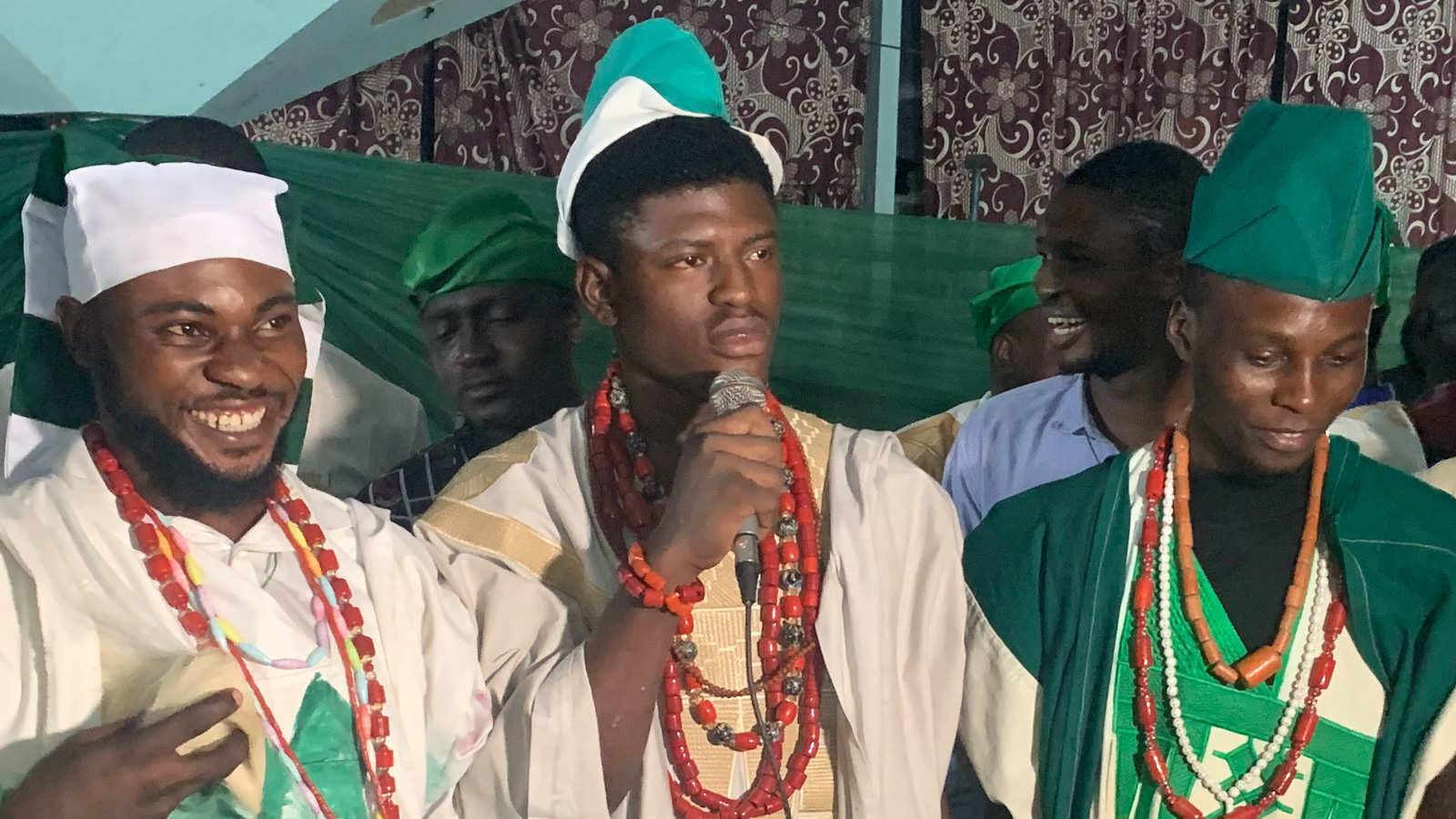It was the dawn of Tuesday, August 1, 2023. In the quadrangle adjacent to the cafeteria of the Nnamdi Azikiwe Hall of Residence of the University of Ibadan in Ibadan, Nigeria, two tall, muscular male undergraduates were stripped down to their boxers and bathed with fresh palm wine and water. Afterwards, the pair were led in a procession of gyration and dancing back to a quaintly coloured brick building with a spacious arena, known as the Shrine, where they would be crowned “Chief and Elder of our ‘fathersis’ kingdom.” The outgoing Chief, Omotunde Peter, newly graduated in Economics, prayed to the gods of the land to fortify his successor and bless his reign, and enjoined all initiated members to support their new Chief in the next keg year.
Six of us nominees, each wishing, hoping and praying to be selected, had camped in a holding room all night as the Elders deliberated on who was most fit to ascend to the throne. The voice of these Elders, we believe, represents the voice of the gods, so we endured the long wait… or, well, since it’s an African thing. We like to say “the gods choose whomever they like,” but in truth, those at the elders’ meeting consider, among other qualities, academic excellence, dedication to the club, charisma and leadership qualities.
By 4:30 am, we were on our feet in a single file in front of the Elders. One of them led my friend, Victor Oluwafemi, and another guy, Tomiwa, to a room, then brought them out again half naked. There was no literal announcement, but these rituals signaled to all initiates that Victor was the choice of the gods to be Chief, while Tomiwa would be the Elder, second in command to the Chief.
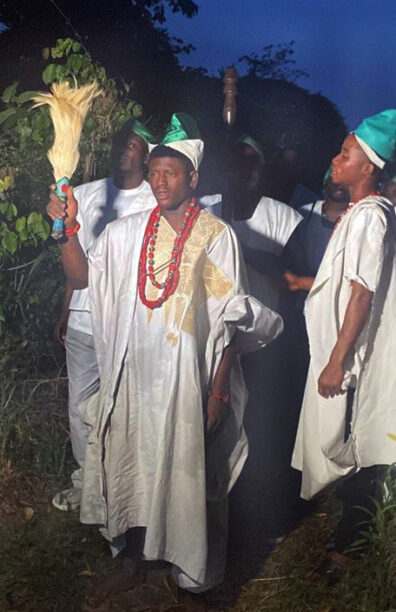
After his coronation, it would be wrong to call my friend by his name or throw playful punches at him. Especially in public, from now on, I shall hail him respectfully as “My Chief”.
Many of our colleagues at school compare us to cultists, while others perceive us as the most unserious elements in the university. In reality, we are simply a socio-cultural club of intelligent students passionate about preserving, propagating and promoting African indigenous culture, and, most importantly, we love to drink palm wine: the drink of our ancestors. We are members of the Kegite Club of Nigeria.
We gather once a week to sing African folksongs, tell stories, and drink palm wine. These activities mirror the ways of life of pre-colonial African communities, especially those of ethnic groups in West Africa like Yoruba, Igbo, Benin, Ashanti (Nigeria, Togo, Benin, Ghana, and Sierra Leone). We interact mainly in what we call kegistic language, a fusion of pidgin English and native languages (Yoruba, Igbo, Ibibio, etc.); we say “fathersis” instead of fathers, “chefe/chefesis” instead of Chief/chiefs, “mahyan” instead of amen, and “Blessmatua” instead of ‘blessing’; when the Chief commands that we “obey the law of gravity”, he means “sit down.” An initiated student member is called a comrad, and becomes a “fellow” or “senior fellow” when he graduates. The symbols of the club are Palm wine, which we call “Holy water,” emblem (a small calabash for drinking Palm wine), and capito/regalia (the cap and clothing worn by initiated members). The colours of the club are green, which stands for vegetation, white for peace and unity, and brown which represents Mother Earth. Our place of gathering, the Shrine, is ceded to the club by the university management. It is considered a sacred place that should not be trod on by non-initiates.
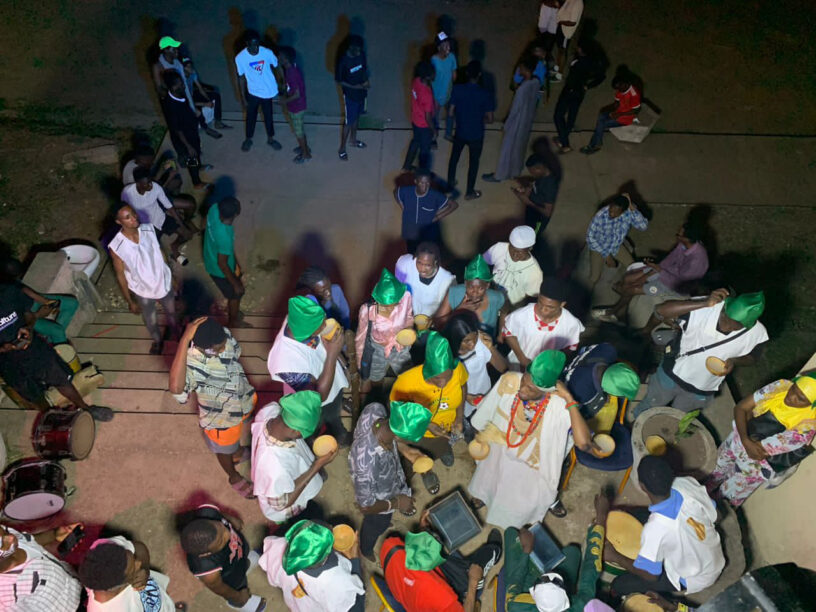
Our club started in 1971 at the University of Ibadan, but before then, there was a Palm Wine Drinkers’ Club founded in 1962 by students of the University of Ife (now Obafemi Awolowo University) at their satellite campus in Ibadan. By the 80s, many socio-cultural clubs similar to the Kegites and the PDC had sprung up, with different names like Palmates, and Ornates, among others. In 1985/86, these groups all came together in a conference of palm wine-related socio-cultural clubs. At the conference, they all adopted the name Kegite Club, the one golden finger salutation (one links his/her index finger with the other’s), a uniform mode of dressing, and a motto—“unity in diversity.” Since then, the University of Ibadan chapter, where I belong, is known as the National Headquarters, the Obafemi Awolowo University branch is called the World Headquarters, and other branches are called ‘Ilya’ (singular) or Ilyasis (plural). The Ilyasis are subsidiaries of the National and World Headquarters, like smaller districts in an empire.
THE CORONATION
About seven days after the selection rites came the coronation ceremony. Victor was brought out in an egungun (masquerade), concealed in a white piece of clothing, before being unveiled to the whole comradium as the new Chief. Even though the ceremony was held at midnight, the school management sent a representative from the Directorate of Student Affairs, while dignitaries flew into the country to witness the coronation of the new Oba emu (King of Palm wine). The chefesis present blessed him in rounds of prayamus, before he was finally unveiled and robed in a new agbada and adorned with royal beads.
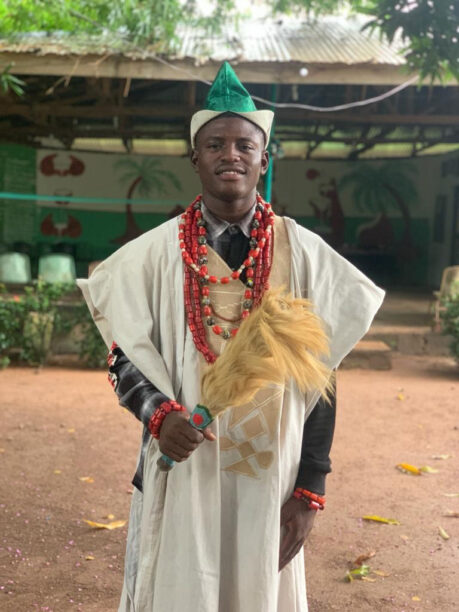
After he had been adorned as royalty, two muscular men carried him on their shoulders into the shrine. He sat on his throne, obviously overwhelmed by his new exalted position; I caught the tinge of excitement on his face, too genuine and passionate to be concealed. I felt then, I was not sure I wanted to be Chief; the accompanying benefits (like special treatment from members and alumni) were enticing, but the burden of leading scores of students and Ilyasis was frightening. Regardless, I was excited that the gods had chosen my friend to be crowned Chief. I went to him with a wide grin and bowed in comic deference. He gave me the one-golden finger salute before opening his arm for a warm embrace. “May you walk and never stumble, my Chief,” I offered in prayer.
As he busied himself greeting other members and well-wishers who approached him to pay homage, my mind flashed back to a couple of years ago when we were both transformed—the Kegite initiation process is called transformation, rather than initiation, in order to distinguish the club from secret societies.
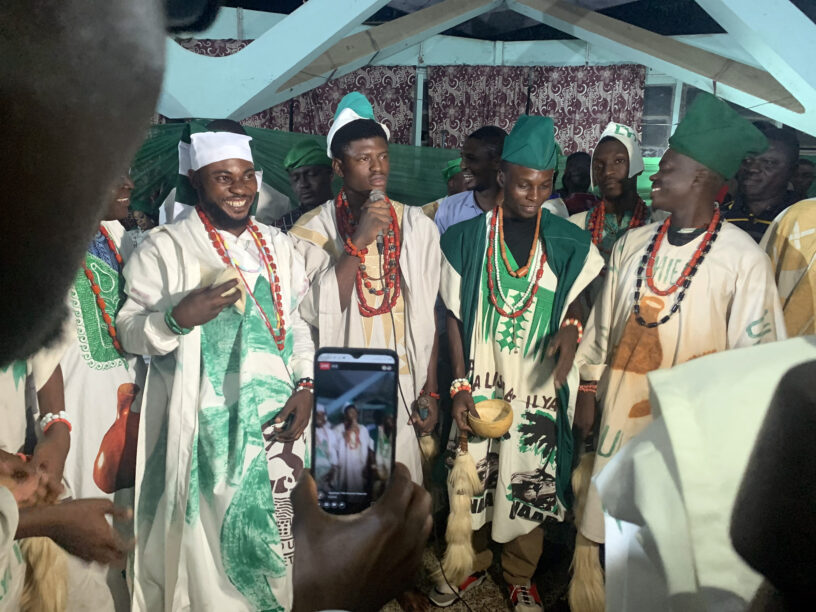 Photo credit: KCN, National Headquarters
Photo credit: KCN, National HeadquartersThis process, called “Transfer of Kariability” (TOK), is guided by an official known as the Philosopher, who teaches intending members about the practices, rules, and regulations of the club. Our Philosopher was a final-year student of Geology, now a graduate, named Nathaniel Adebiyi. Humble, kind, and cheerful Nathaniel proved a deep repository of knowledge, a walking library of African cultural heritage. Under his tutelage, we became “karid entities” (the kegite way of saying a person is cultured or recognised).
THE PRESERVATION OF AFRICAN CULTURE
At a time when African culture is eroding and succumbing to Western culture, the Kegite Club, through its activities, songs and practices, reminds people of the true African cultural heritage. Our “gyration songs” are mainly African folk songs, sung in our native Yoruba or Igbo or Ibibio languages and embellished with rhythmic beats from iconic traditional drums like gangan and gbedu, among others. The lyrics of the songs range from moral teaching to the adulation of heroes and ancestral beings.
The leadership of our club reflects the pre-colonial monarchical system in some African kingdoms, like the Oyo and Benin empires in present-day Nigeria, and the Ashanti kingdom in present-day Ghana, among others—all of which have the supremacy of the monarch. The AB Chief of our club is treated just like a regular king would be treated. He is assisted by a council of officials called Grand Lords (G-Lords), whose duties and portfolios correspond to the socio-political systems of pre-colonial African communities.
For instance, the official known as “Feda” (as in Feather) is the secretary-general of the club. This title is informed by the old writing practice in which men write with feather and ink. The official called “Parrot” is the public relations officer, who conveys all internal and external information and also promotes the image of the club. This alludes to the significance of the parrot (the gray species in particular) in many African tribes. Among the Yoruba people, parrots’ characteristic beauty, sociability and vocal versatility cause them often to be cast as spies and sentinels in folklore.
Sam Nwaoko, who is currently a Deputy Editor at the Nigerian Tribune, Nigeria’s oldest private national newspaper, was a comrad during his undergraduate years at the University of Ibadan, and rose to the position of “Elder” in the Kegite Club. Mr. Nwaoko recently described the club to me as “Everything African—language, dressing, music, drinks, leadership system, etc.”
“The club is structured to assume the ideals of the civilisation of pre-colonial Africa, when respect for nature, culture, tradition, natural hierarchy and status reigned. In addition, the leadership as provided by the elders of the community was the order of the day, and this could be seen in the pristine orderliness of the Kegites Club. The club was actually founded to counter the debilitating influence and annoying dominance of the colonialists in our time.
“Respect for African tradition is paramount and uncompromised. To non-members, among the first exemplifiers is that respect accorded the Chief. For instance, you cannot be unruly and remain in The Kegites Club, National Headquarters, University of Ibadan. You will be expelled (dekeged) as we know it,” he said with pride.
We also spoke about some of the challenges confronting the club, especially its infiltration by cultists—members of secret cults in universities that have become notorious for violence, crimes and brutality. I told him we try our best to weed them out, and to the best of my knowledge there are currently no more cultists at the National Headquarters, but I can’t guarantee this to be true of other Ilyasis. He noted that it had been the same in the 90s when he was a Comrad, and he shared an approach which they used to counter it.
“The infiltration of cultists in the Club is not a new development. During my time as a member of the club’s executive, known among us as Grand Lords (G-Lords), we formed a committee which discreetly investigated suspicious members and those found to be in breach of the rules of our Club were handed over to the Students Affairs Office, headed then by Professor Ikotun, for necessary action. So we have always lived with the glitch of bad people seeping into the club from banned, unwholesome groups. It didn’t start now, and I don’t see it ending anytime soon.”
Thankfully, the club enjoys the patronage and association of influential and respected people in society—media gurus, academics, politicians, and so on.
Rotimi Akeredolu, a Senior Advocate of Nigeria and Governor of Ondo State is a proud member of the club, and he is seen here gyrating with comrads and fellowsis of the club after he was sworn in as governor. Former President Olusegun Obasanjo is the eternal grand patron of the club.
The Kegites Club has stayed true to its ideals for over five decades of its existence: Preserving and promoting African culture and exhibiting entertainment in the African way, while also warding off the criminals and cultists who sometimes infiltrate it for cover. The intellectuals and respected members of society who make up its membership are unrelenting in upholding the integrity of this club. As Mr. Nwaoko told me, our club’s founders wanted to rescue the African culture from the “brutal vandalism” of colonialism, and, most importantly, to instill traditional cultural ideals in the young people who will determine the future of Africa.

